汉英词语比较
英汉词语对比记忆单词

怎样通过英汉词语对比记忆单词随着国家之间的交往、文化的接触和思想的沟通,每一种语言都会吸收外来语,补充和扩大自己的词汇。
英语的有些外来词语就是从中国“进口”的。
如Confucius(孔夫子)、ginseng(人参)、kaoliang(高粱)、lama(喇嘛)、li(里)、litchi(荔枝)、silk(丝)、to lose face(丢脸)、paper tiger(纸老虎)。
同样,汉语也从英语中引起了许多外来语。
如滴滴涕(DDT或D.D.T.)、可可(cacao)、可口可乐(Coca-Cola)、奎宁(quinin)雷达(radar)、吗啡(morphine)等。
有些词语从英语中“引进”以后,通过半译音半译意的方式稍加改造,便洋为中用,成了具有中国特色的一种“中西合璧”的词,如ice-cream(冰淇淋)、tomato sauce(番茄沙司)、Dowling paper(道林纸)等。
英语有一些词语被直译成汉语,原封不动地放到我们的语言中,时间久了,耳濡目染,习以为常,我们也不对它们另眼相看了。
如to pave the way for (为……铺平道路)等。
除了上述“引进”的词语以外,我们在学习英语的时候如果稍加留心,就会发现英汉两种语言在习语、比喻、量的表示法和谚语等方面有着相通或相似的地方,如to make one's mouth water(使垂涎),as busy as a bee(像蜜蜂一样忙碌),a cup of tea(一杯茶)等等。
在英语学习中,遇到上述几种情况时,似乎“一见如故”往往可以“望词生义”,且易记难忘。
在学习英语词汇的时候,将英汉两种语言进行对照比较,寻根溯源,弄清其中相同、相似和不同的地方,会帮助我们加深理解,巩固记忆。
下面进一步举例说明:一、汉语从英语“进口”的外来词语ampere安培(电流强度单位);mango芒果bar酒吧,酒柜marathon(race)马拉松beer啤酒mark马克brandy白兰地酒Martin furnace马丁炉(平炉)bus巴士,公共汽车microphone麦克风,话筒card卡片modern摩登c.c.西西(容量单位)morphine吗啡(毒品名)chocolate巧克力motor马达,发动机cigar雪茄(烟)motorcycle摩托车coffee咖啡Moslem穆斯林(伊斯兰教徒的通称)disco迪斯科舞nicotine尼古丁Downing Street唐宁街Nobel prizes诺贝尔奖金dozen一“打”(数量单位)nylon尼龙dyne达因(力的单位)Olympic games奥林匹克运动会engine引擎,发动机opium鸦片farad法拉(电容的单位)palace派力司fascism法西斯pence便士(英币单位)franc法郎papa爸爸gallon加仑(容量单位)penicillin(药)盘尼西林,青霉素golf高尔夫球ping-pong乒乓guitar吉他pint品脱(容量单位)hallo(a),hello,hullo(a)哈罗!喂!poker扑克牌humor幽默pound磅(重量单位);英镑hysteria歇斯底里pudding布丁(甜食之一种)inch英寸pump抽水机,泵jacket夹克quinine(药)奎宁,金鸡纳霜jazz爵士乐radar雷达(侦测仪器名)jeep吉普车sandwich三明治lemons柠檬shock休克lemonade柠檬水smart时髦logic逻辑soda苏打sofa沙发椅black market黑市tank坦克车black list黑名单ton吨(重量单位)cold war冷战waltz华尔兹舞golden age黄金时代watt瓦特(电的功率单位)first-hand第一手的wattmeter瓦特计second-hand第二手的whisky威士忌酒doubles-faced两面派的to break the record打破记录armed to the teeth武装到牙齿的life line生命线二、英汉相通或易于理解的比喻(as)black as ink墨黑(as)light as a feather轻如鸿毛as cold as ice冰冷(as)silly as a goose像呆头鹅一样傻(as)fat as a pig胖得像猪(as)still as death像死一样静(死寂)(as)green as grass像草一样绿(as)sweet as honey蜜一样甜(as)handsome as paint美丽如画(as)white as snow雪白as hard as rock坚如磐石as blind as a bat瞎得像蝙蝠(as)hard as a stone像石头一样硬s bold as a lion像狮子一样勇猛as hot as fire火热(as)happy as a king像国王一样高兴三、英汉在量的表示法方面的类同a pot of water一壶水 a packet of cigarettes一包香烟a pot of drinks一壶饮料ton of steel一吨钢a tin of butter一听奶油 a handful of rice一把米a box of matches一盒火柴spoonful of salt一汤匙盐a bucket of oil一桶油mouthful of water一口水a beg of beans一袋豆group of children一群孩子四、英汉相通或相似的习语to burn one's boats破釜沉舟to pour oil on the fire火上加油to play with fire玩火facts speak louder than wordsto buy off收买to set one's heart at rest(ease)放心more or less或多或少to sit on the fence骑墙far and near四面八方to stand on one's own feet(legs)自立heart and soul 一心一意to turn for the better好转rain or shine风雨无阻to see how the wind blows见风使舵to pick and choose挑来挑去to make one's mouth water使垂涎to divide and rule分而治之to hurt one's feelings伤感情to be absent-minded心神不定to see the world见世面to turn a deaf ear to充耳不闻to get in through the back door走后门to shut one's eyes against视若无睹to praise to the skies捧上天去Easy come,easy go.来得容易去得快,易得易失to talk black into white(to prove that black is white)颠倒黑白Faith will move mountains.精诚所至,金石为开to go through fire and water赴汤蹈火to swim with the stream(tide或 current)随波逐流(随大流)Out of sight,out of mind.眼不见,心不想;久别情疏a bad (rotten)egg坏蛋Strike while the iron is hot.趁热打铁a tooth for a tooth以牙还牙East or west,home is best.出门一里,不如家里an eye for an eye以眼还眼skin-deep肤浅Ill news travels fast.恶事传千里in at one ear and out at the other一只耳朵进,一只耳朵出Kill two birds with one stone.一箭双雕Love me,love my dog.爱屋及乌heaven knows天晓得Make hay while the sun shines.趁热打铁women have long tongues妇有长舌like father,like son有其父,必有其子Many hands make light work.人多好办事at sixes and sevens乱七八糟Speech is the picture of the mind.言为心声in high spirits兴高采烈in low spirits垂头丧气No one is wise at all time.智者千虑,必有一失out of order杂乱无章off and on断断续续There is no smoke without fire.无风不起浪back and forth前前后后through and through彻头彻尾Time flies.光阴似箭这里应该指出的是,英语同汉语是属于两种不同语系的语言,我们研究其异同,了解汉语从英语中“进口”的词语,分析两种词语在表达方法上的类同之处,有助于我们巩固记忆,扩大词汇量。
英汉词语对比分析
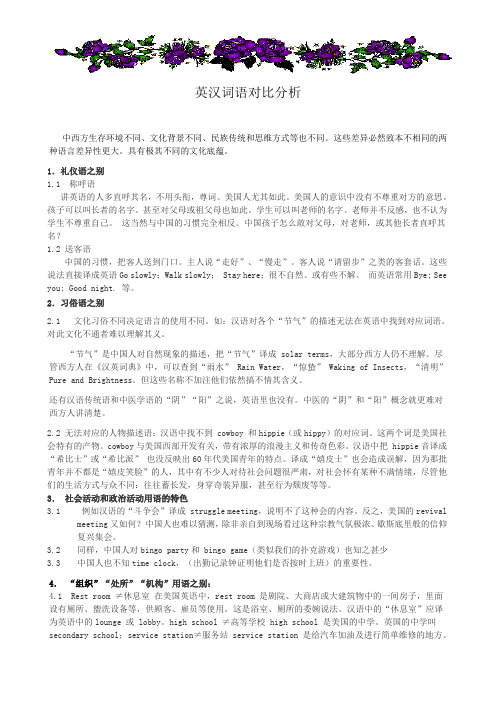
英汉词语对比分析中西方生存环境不同、文化背景不同、民族传统和思维方式等也不同。
这些差异必然致本不相同的两种语言差异性更大。
具有极其不同的文化底蕴。
1.礼仪语之别1.1 称呼语讲英语的人多直呼其名,不用头衔,尊词。
美国人尤其如此。
美国人的意识中没有不尊重对方的意思。
孩子可以叫长者的名字。
甚至对父母或祖父母也如此。
学生可以叫老师的名字。
老师并不反感,也不认为学生不尊重自己。
这当然与中国的习惯完全相反。
中国孩子怎么敢对父母,对老师,或其他长者直呼其名?1.2 送客语中国的习惯,把客人送到门口。
主人说“走好”、“慢走”。
客人说“请留步”之类的客套话。
这些说法直接译成英语Go slowly;Walk slowly; Stay here;很不自然。
或有些不解。
而英语常用Bye; See you; Good night. 等。
2.习俗语之别2.1 文化习俗不同决定语言的使用不同。
如:汉语对各个“节气”的描述无法在英语中找到对应词语。
对此文化不通者难以理解其义。
“节气”是中国人对自然现象的描述,把“节气”译成 solar terms,大部分西方人仍不理解。
尽管西方人在《汉英词典》中,可以查到“雨水” Rain Water,“惊蛰” Waking of Insects,“清明”Pure and Brightness。
但这些名称不加注他们依然搞不情其含义。
还有汉语传统语和中医学语的“阴”“阳”之说,英语里也没有。
中医的“阴”和“阳”概念就更难对西方人讲清楚。
2.2 无法对应的人物描述语:汉语中找不到 cowboy 和hippie(或hippy)的对应词。
这两个词是美国社会特有的产物。
cowboy与美国西部开发有关,带有浓厚的浪漫主义和传奇色彩。
汉语中把 hippie音译成“希比士”或“希比派”也没反映出60年代美国青年的特点。
译成“嬉皮士”也会造成误解,因为那批青年并不都是“嬉皮笑脸”的人,其中有不少人对待社会问题很严肃,对社会怀有某种不满情绪,尽管他们的生活方式与众不同:往往蓄长发,身穿奇装异服,甚至行为颓废等等。
英汉词语对比记忆单词

怎样通过英汉词语对比记忆单词随着国家之间的交往、文化的接触和思想的沟通,每一种语言都会吸收外来语,补充和扩大自己的词汇。
英语的有些外来词语就是从中国“进口”的。
如Confucius(孔夫子)、ginseng(人参)、kaoliang(高粱)、lama(喇嘛)、li(里)、litchi(荔枝)、silk(丝)、to lose face(丢脸)、paper tiger(纸老虎)。
同样,汉语也从英语中引起了许多外来语。
如滴滴涕(DDT或D.D.T.)、可可(cacao)、可口可乐(Coca-Cola)、奎宁(quinin)雷达(radar)、吗啡(morphine)等。
有些词语从英语中“引进”以后,通过半译音半译意的方式稍加改造,便洋为中用,成了具有中国特色的一种“中西合璧”的词,如ice-cream(冰淇淋)、tomato sauce(番茄沙司)、Dowling paper(道林纸)等。
英语有一些词语被直译成汉语,原封不动地放到我们的语言中,时间久了,耳濡目染,习以为常,我们也不对它们另眼相看了。
如to pave the way for (为……铺平道路)等。
除了上述“引进”的词语以外,我们在学习英语的时候如果稍加留心,就会发现英汉两种语言在习语、比喻、量的表示法和谚语等方面有着相通或相似的地方,如to make one's mouth water(使垂涎),as busy as a bee(像蜜蜂一样忙碌),a cup of tea(一杯茶)等等。
在英语学习中,遇到上述几种情况时,似乎“一见如故”往往可以“望词生义”,且易记难忘。
在学习英语词汇的时候,将英汉两种语言进行对照比较,寻根溯源,弄清其中相同、相似和不同的地方,会帮助我们加深理解,巩固记忆。
下面进一步举例说明:一、汉语从英语“进口”的外来词语ampere安培(电流强度单位);mango芒果bar酒吧,酒柜marathon(race)马拉松beer啤酒mark马克brandy白兰地酒Martin furnace马丁炉(平炉)bus巴士,公共汽车microphone麦克风,话筒card卡片modern摩登c.c.西西(容量单位)morphine吗啡(毒品名)chocolate巧克力motor马达,发动机cigar雪茄(烟)motorcycle摩托车coffee咖啡Moslem穆斯林(伊斯兰教徒的通称)disco迪斯科舞nicotine尼古丁Downing Street唐宁街Nobel prizes诺贝尔奖金dozen一“打”(数量单位)nylon尼龙dyne达因(力的单位)Olympic games奥林匹克运动会engine引擎,发动机opium鸦片farad法拉(电容的单位)palace派力司fascism法西斯pence便士(英币单位)franc法郎papa爸爸gallon加仑(容量单位)penicillin(药)盘尼西林,青霉素golf高尔夫球ping-pong乒乓guitar吉他pint品脱(容量单位)hallo(a),hello,hullo(a)哈罗!喂!poker扑克牌humor幽默pound磅(重量单位);英镑hysteria歇斯底里pudding布丁(甜食之一种)inch英寸pump抽水机,泵jacket夹克quinine(药)奎宁,金鸡纳霜jazz爵士乐radar雷达(侦测仪器名)jeep吉普车sandwich三明治lemons柠檬shock休克lemonade柠檬水smart时髦logic逻辑soda苏打sofa沙发椅black market黑市tank坦克车black list黑名单ton吨(重量单位)cold war冷战waltz华尔兹舞golden age黄金时代watt瓦特(电的功率单位)first-hand第一手的wattmeter瓦特计second-hand第二手的whisky威士忌酒doubles-faced两面派的to break the record打破记录armed to the teeth武装到牙齿的life line生命线二、英汉相通或易于理解的比喻(as)black as ink墨黑(as)light as a feather轻如鸿毛as cold as ice冰冷(as)silly as a goose像呆头鹅一样傻(as)fat as a pig胖得像猪(as)still as death像死一样静(死寂)(as)green as grass像草一样绿(as)sweet as honey蜜一样甜(as)handsome as paint美丽如画(as)white as snow雪白as hard as rock坚如磐石as blind as a bat瞎得像蝙蝠(as)hard as a stone像石头一样硬s bold as a lion像狮子一样勇猛as hot as fire火热(as)happy as a king像国王一样高兴三、英汉在量的表示法方面的类同a pot of water一壶水 a packet of cigarettes一包香烟a pot of drinks一壶饮料ton of steel一吨钢a tin of butter一听奶油 a handful of rice一把米a box of matches一盒火柴spoonful of salt一汤匙盐a bucket of oil一桶油mouthful of water一口水a beg of beans一袋豆group of children一群孩子四、英汉相通或相似的习语to burn one's boats破釜沉舟to pour oil on the fire火上加油to play with fire玩火facts speak louder than wordsto buy off收买to set one's heart at rest(ease)放心more or less或多或少to sit on the fence骑墙far and near四面八方to stand on one's own feet(legs)自立heart and soul 一心一意to turn for the better好转rain or shine风雨无阻to see how the wind blows见风使舵to pick and choose挑来挑去to make one's mouth water使垂涎to divide and rule分而治之to hurt one's feelings伤感情to be absent-minded心神不定to see the world见世面to turn a deaf ear to充耳不闻to get in through the back door走后门to shut one's eyes against视若无睹to praise to the skies捧上天去Easy come,easy go.来得容易去得快,易得易失to talk black into white(to prove that black is white)颠倒黑白Faith will move mountains.精诚所至,金石为开to go through fire and water赴汤蹈火to swim with the stream(tide或 current)随波逐流(随大流)Out of sight,out of mind.眼不见,心不想;久别情疏a bad (rotten)egg坏蛋Strike while the iron is hot.趁热打铁a tooth for a tooth以牙还牙East or west,home is best.出门一里,不如家里an eye for an eye以眼还眼skin-deep肤浅Ill news travels fast.恶事传千里in at one ear and out at the other一只耳朵进,一只耳朵出Kill two birds with one stone.一箭双雕Love me,love my dog.爱屋及乌heaven knows天晓得Make hay while the sun shines.趁热打铁women have long tongues妇有长舌like father,like son有其父,必有其子Many hands make light work.人多好办事at sixes and sevens乱七八糟Speech is the picture of the mind.言为心声in high spirits兴高采烈in low spirits垂头丧气No one is wise at all time.智者千虑,必有一失out of order杂乱无章off and on断断续续There is no smoke without fire.无风不起浪back and forth前前后后through and through彻头彻尾Time flies.光阴似箭这里应该指出的是,英语同汉语是属于两种不同语系的语言,我们研究其异同,了解汉语从英语中“进口”的词语,分析两种词语在表达方法上的类同之处,有助于我们巩固记忆,扩大词汇量。
英汉后缀词比较

英汉后缀词比较一、词缀的定义词缀这一概念引自西方语言学,布龙菲尔德( Bloomfield ) 在《语言论》中这样给词缀下定义:“在次要派生结构中那些附加在基础形式上的粘附形式就是词缀(affixes)”。
一般说来,语素必须具备以下三个特点才能称之为词缀:1.词汇意义虚化,只表示某种抽象概括的语法类义。
2.位置固定,即总是在词首或词尾。
3.构词能力强。
虽然如此,学界对于词缀的确认仍有严式和宽式的不同。
“严式”根据词缀的三个特点来判定词缀属性,尤以“语义完全虚化”作为主要标准。
这种观点以朱德熙为代表,他认为:真正的词缀只能粘附在词根成分上头,它跟词根成分只有位置上的联系,没有意义上的关系。
吕先生还认为,有些语素差不多可以算是前缀或后缀,但因为它们在语义上还没有完全虚化,有时候还以词根的面貌出现,所以只可以称之为类前缀或类后缀。
这种比较宽容地确定词缀的意见属“宽式”。
二、英语后缀词英语和汉语的后缀主要特点相同,即都是附加在某实素词后构词的。
与前缀不同,英语的后缀主要是改变原词干的词性,在意义上只是对原义加以修饰而已。
根据后缀改变词性这一特征,可把后缀归纳成四大类(Quirketa1.1985:1539—1557):(1)名词后缀(构成的词全部为名词)加在名词后表“人”或“物”:一eer、一er、ess、一ette、一let、一ster加在动词后表“人”或“物”:一ant、一ee、一ent、一er;加在名词后表“人、民族”或“语言、信仰”:一ese、一an、一ist、一ite;加在名词后表“性质、状态”:一age、一dom、一ery(一ry)、一ful、一hood、一ing、一ism、一ship加在动词后表“性质、状态”:一age、一al、一ance、一ation、一ence、一ing、一ment;加在形容词后表“性质、状态”:一ity、一ness;(2)形容词后缀加在名词后:一ed、一ful、一ish、一less、一like、ly、一Y、一al(一ial、一ical)、一es —que、一ic、一OUS(一eous、一ious、一UOUS);加在动词后:~able(一ible)、一ative(一ive、一sive);(3)副词后缀加在形容词后:一ly;加在名词或形容词后:~ward(一wards);加在名词后:~wise;(4)动词后缀(都加在名词和形容词后)一ate、一en、一ify、一ize(一ise)。
英汉语言对比研究-词法对比翻译

三、汉英词汇视点差异
汉英两民族在思维上差异,表现在语言思维视点上也有 差异——从不同的思维视角来看待同一事物 。其具体差 异如下: 1.汉英修饰词的转换 A. 有时英语修饰词与汉语相反的情况: 抢险车 a breakdown lorry (不等于 a lorry that has broken down) 防暴警察 riot police (即 anti-riot police) 消防队 a fire brigade 打九折 a 10 percent discount 寒衣 warm clothes 候机室 the departure lounge
汉语词义的模糊性有其优点,有利于词汇的组合与 灵活运用,但在英译时,由于汉英在形象与喻义、所指 与内涵方面存在较大差异,稍不注意便可能导致语义不 准确。
1.形象与喻义 形象与喻义
如: (1).现在的问题时抓“落实”,以确保已出台的政 策措施全部到位。 从字面上看,英语的“抓”, “出台”, “到位”都不合此 上下文,这是汉语的形象表达,在译文中要用“使生 效”、“实行”和“执行”才能将英语实际意义表达出 来呢? To ensure full implementation of the polices and measures already introduced, the question now is how to bring them into effect.
自学 teacher himself (a self-taught student)
E. 观察事物的角度或联想意义不一样 close the door behind you.——着眼于人所在的位置 随手关门——着眼于手 lie on one ‘ s back ; lie on one ’ a stomach -一以后背为准; 仰卧;伏卧一一以面向为准 胆小如鼠 as timid as a rabbit ; 蠢得像猪 a s stupid as a goose 雨后春笋 be like bamboo shoots after a spring rain F.词语的排列顺序不同 前后back and forth 新旧old and new 冷热hot and cold
英汉名词动词对比对比课件
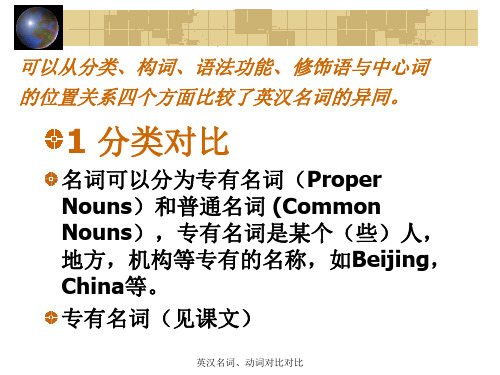
英汉名词、动词对比对比
2)英语名词和汉语名词有时都可以做状语 ,但汉语可
单独作状语,英语名词常常是和其他的修饰语一起构成 名词词组作句子的状语
例如:“集体购票、电话购票、笑脸迎人、公 费出国留学、现金支付、现场直播、批判继承” 等。
• 一个单词充当定语时, 前置。She is a beautiful girl!
• 而一个词组或一个句子充当定语时则要后置,
• 电影《黑巷少女》” The Little Girl Who Lives Down the Lane “ • A lone girl who lives with her father whom hasn't been seen for quite
[The moment]he saw me, he nodded me
[The moment]是名词做状语
单词作状语(不是词组)的例外。
英汉名词、动词对比对比
单词作状语的例外,what did you do yesterday?(“They waited hours.
next/last/this/one/every/each/some/any/all+
今天星期六(名词作谓语表时间), 昨天国庆节(名词作谓语表节日), 昨天晴天(名词作谓语表天气), 王小华,绍兴人(名词作谓语表籍贯 )。 潘老太太五十七岁了(名词作谓语表年 龄), 她大眼睛,红脸蛋(名词作谓语表容 貌)。
英汉名词、动词对比对比
汉语的名词谓语句一般都可以加 “是”,很像英语中的系表结构。
a long time
湖南自考·英汉语言文化比较(词语)
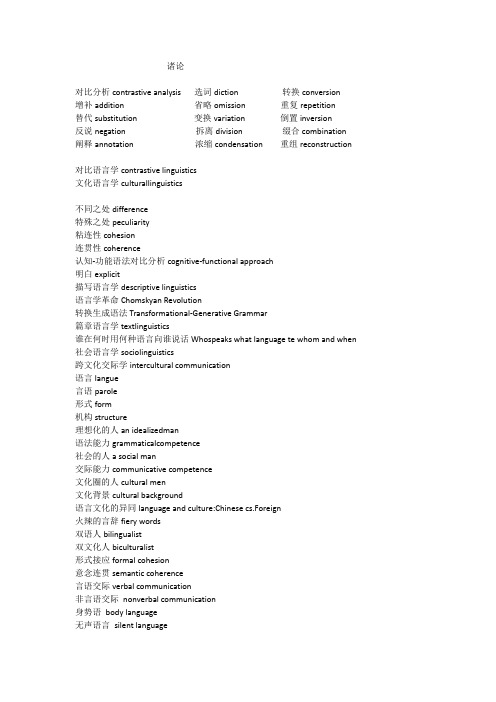
诸论对比分析contrastive analysis 选词diction 转换conversion增补addition 省略omission 重复repetition替代substitution 变换variation 倒置inversion反说negation 拆离division 缀合combination阐释annotation 浓缩condensation 重组reconstruction对比语言学contrastive linguistics文化语言学culturallinguistics不同之处difference特殊之处peculiarity粘连性cohesion连贯性coherence认知-功能语法对比分析cognitive-functional approach明白explicit描写语言学descriptive linguistics语言学革命Chomskyan Revolution转换生成语法Transformational-Generative Grammar篇章语言学textlinguistics谁在何时用何种语言向谁说话Whospeaks what language te whom and when 社会语言学sociolinguistics跨文化交际学intercultural communication语言langue言语parole形式form机构structure理想化的人an idealizedman语法能力grammaticalcompetence社会的人a social man交际能力communicative competence文化圈的人cultural men文化背景cultural background语言文化的异同language and culture:Chinese cs.Foreign火辣的言辞fiery words双语人bilingualist双文化人biculturalist形式接应formal cohesion意念连贯semantic coherence言语交际verbal communication非言语交际nonverbal communication身势语body language无声语言silent language文化冲击culture shock和平队Peace Corps隐性文化covert culture跨文化意识cross-cultural awareness丑陋的美国人The Ugly American无声的语言The Silent language我们为何是丑陋的美国人Why are we Ugly Americans文化意识cultural literacy跨文化教育、训练和研究学会Society for Intercultural Education, Training and Research 语言能力linguistic competence合乎语法grammaticality恰当/得体appropriateness接受acceptability美国外语教学协会American Council on the Teaching of Foreign Languages综合语与分析语变化形式(hereditary inflections)综合—分析语(synthetic-analytic language)语调(intonation)声调(tone)词缀变化(affixation)前缀(prefix)后缀(suffix)动词的变化(conjugation)副词的变化(declension)性(gender)数(number)格(case)时(tense)体(aspect)语态(voice)语气(mood)比较级(degree of comparison)人称(person)词性(parts of speech)我们的学校(our school)你看见了没有(have you see it)思维方式(relational thinking)爱能征服一切(love conquers all things)保持一致(S-V concord)结构性倒装(structural inversion)功能性倒装(functional inversion)语法关系一致(grammatical concord)英语里多作定语,少作谓语(heavy attribute, small predicate)汉语里则多作谓语,少作定语(small attribute, heavy predicate)头轻脚重(end-weight)让人印象深刻(each ismore impressive than the preceding)直线型(straight line)螺旋型(circular line)演绎式(deductive)归纳式(inductive)混合式(hybrid)其临摹性(isomorphism)直线式(linear)迂回式(cyclical)主题句(topic sentence)虚词(form words)结构词(structural words)功能词(function words)连接词(coordinators)从属连接词(subordinators)虚词(empty words)介词、助词(particles)虚词、实词(notion words或full words)语气助词(emotional particles)语调(intonation)声调(tones)语调(intonation)重音(stress)降调(falling tone) 升调(rising tone) 降升调(fall-rise) 升降调(rise-fall)平调(level) 降加升调(fall-plus-rise)双音节化和四音节化(predominance of disyllables and quadrisyllables over monosyllables and trisyllables)刚性与柔性两者协调一致(S-V concord)关系网络(connective nexus)聚集型(compactness)核心(kernel)动词造句的形式(verb pattern)主谓结构(subject-predicate)语法一致(grammatical concord)意义一致(notional concord)流散型(diffusiveness)话题(topic)说明(comment) 注重主语(subject-prominent)注重话题(topic-prominent) 形合(hypotaxis)意合(parataxis)话题+说明(topic+comment)语法功能灵活多变(flexibility of grammatical function)非逻辑表达方式(illogical expressions)晒太阳to bask in the sun.晒衣服to sun one’s clothes吃食堂to have one’s meals in the mess吃苹果to eat an apple还他的债to pay him one’s debts还他的钱to pay him back住四人four people live in …住旅馆to stay at a hotel在家养病to recuperate at home闭目养神to sit in repose with one’s eyes closed救火fire fighting救国to save the nation打扫卫生to do some cleaning打扫房间to clean the room补充缺额to fill a vacancy补充人力to replenish manpower恢复疲劳to get refreshed恢复健康to recover one’s healtheggplant(茄子) sweetmeat(是糖果、蜜线,不是甜的肉)quicksand(流沙) fill out(填写)a slim chance= a fat chance:渺茫的机会quite a lot= quite a few:相当多,不少burn dow(烧成平地) burn up(烧掉)hamburger(汉堡包) ham(火腿)The alarm went on(闹响) went off(闹响)boxing rings(拳击台) public bathrooms(公共厕所)baths(浴室) sweetbread(甜面包)drive on a parkway(公园大道上开车)a wise man(聪明的人) a wise guy(自以为是的人)overlook(忽视,忽略) oversee(监视,监督,看管)pineapple(菠萝) pine(松树)apple(苹果) Stars are out(能看见星星)Lights are out(看不见灯光)wind up my watch(让表开始走)wind up this article(不是开始写文章,而是文章写完了)完全句(full sentence)不完全句(minor sentence)破句(fragments)形式接应(formal cohesion)意念连贯(semantic coherence)显性(explicitness)刚性(rigidity)引性(implicitness)柔性(suppleness)形合与意合形合法(hypotaxins)意合法(Parataxis)显性接应(overt cohesion.)连接手段和形式(cohesive ties)简单介词(如with,to,in,of,about,between,through)合成介词(如inside,onto,upon,within,without,throughout)成语介词(如according to,along with,apart from,because of,in front of,on behalf of,with regard to)保持前后一致的关系(grammatical and notional concord)替补词(expletives)显性(explicit)逻辑-语法关系链接词语(logic-grammatical connector)低语境(low-context)作者责任型(writer-responsible)隐性连贯(covert coherence)严谨(preciseness)简洁(conciseness)隐性(implicit)高语境(high-context)读者责任型(reader-responsible)繁复与简短从属结构(subordination)又繁又长(1ong-winded)包孕式的复合句(complex sentences with embedded clauses)将几个从属子句相互衔接(dovetail several dependent clauses into each other)主谓核心协调(S-V concord)楼房建筑法(architecture style)关系联结(conjunctive nexus)旧时流行词语(outworn words and phrases)喜欢的长诗(lovely long words)闪烁其词(hedging)晦涩不清(obscurity)卖弄、表现(shou off)并列句(coordination)并列形式的复句(composite sentence)流水记事法(chronicle style)各个过程(streamline the thoughts)句首封闭、句尾开放(right-branching)末端重量(end-weight)顺线性向后扩展延伸(natural linear expansion)句首开放、句首收缩(left-branching)逆线性向前扩展延伸(reversed linear expansion)顺线性向后扩展延伸(natural linear expansion:right-branching)顺线性向前扩展延伸(reversed linear expansion:right-branching)关键词语(key word)主题句(topic sentence)结构(subordination)直线性(linearity)突显语序(salient order)领悟式的归纳型(because-therefore structure)螺旋式(circular/spirsl/indirect)自然语序(natural order)单调感(monotony)物称与人称拟人化(personification)无灵主语(inanimate subject)有灵动词(animate verb)填补词(expletive)先行词(preparatory “it”)非人称被动式(impersonal passive)施动者(doer或agent)客观(objective)客观(objective)婉转(roundabout)被动式(agentless passive)公文文体(bureaucratese)承担可能有错的责任(a pusillanimous shrinking from responsibility) 无主句(subjectless sentences)主语省略句(subject-omitted sentences)无形式标志的被动句(passives with no grammatical marks)非人称向(depersonalization)被动与主动表达习惯(passive habit)人称主语(vague pronoun subject)末端中心(end focus)末端重量(end weight)灵活多变(add variety to writing)信息性的(informative)客观叙述(impersonal activity seen objectively)翔实、冷静(calm fact—teller)罗唆(wordy)间接(indirect)无力(weak)隐晦(oracular)故弄玄虚(mysterious)而深不可测(impenetrable)被动的烟幕(passive smoke-screen)科技文章(technical writing)报刊文章(newspaperese)官方文章(bureaucratese)结构被动句(syntactic passive)意义被动句(notional passive)人称被动式(impersonal passive)双重被动式(double passive)examinee(=person examined) 受审查者;受试人;考生referee(=to whom a question is referred) 受委托者his astonishment(=he was astonished) 他感到惊讶the man’s trial(=the man was tried) 那个人受审问the imprisonment of the murderer(=the murderer was imprisoned) 凶手被监禁eatable(=fit to be eaten) 可吃的desirable(=to be desired) 想要的visible(=that can be seen) 可以看见的respectable(=deserving respect)值得尊敬的in one’s possession/in the possession of someone(= owned,held,kept or controlled by someone)为某人所有,在某人的控制之下under the influence (of alcoho1)(=drunk;affected by alcohol) 酒醉不幸语态(inflictive voice)不企望的事(unpleasant or undesirable)语用性位移(pragmatic movement)主题(topic)话题(theme)通称(generic person)It is said that… 有人说,据说,据云It is well known that… 大家知道,众所周知It is generally considered that… 人们普遍认为语态的限制(voice constraints)动词限制(verb constraints)宾语限制(object constraints)施事的限制(agent constraints)意义的限制(meaning constraints)频率的限制(frequency constraints)想象性的(imaginative)信息性的(informative)静态(stative)动态(dynamic)名词化(Nominalization)名词优势于动词的倾向(preponderance of nouns over verbs) 名词化表达法(nominal style)冗长(wordy)含糊(vague)缺乏活力(1ifeless)施事者(agentive noun)行为和动作(如realize—realization,complete—completion) 标题式短语(Headline phrase)刺激性的词语(stimulating words)名词作为前置定语(heavy premodification of nouns)信息负荷过重(unnecessarily overweighted)过分堆积名词(noun pileups)名词连用作修饰语(multiple noun adjunct)名词作定语(nounattribute)prestige university= prestigious university有名望的大学race hatred= racial hatred种族仇恨affluence society= affluent society富裕社会launch pad= launching pad发射台economy measure节约措施economic measure经济措施bankruptcy lawyer处理破产诉讼的律师bankrupt businessman破了产的商人efficiency expert 研究提高工作效率的专家fficient worker工作效率高的工人obesity specialist肥胖病专家obese specialist胖专家介词充斥(prepositionitis)乏味的名词(ponderous nouns)淡化(dilute)迂回(circumlocution)弱化表达法(debilitated style)啰嗦(wordy)累赘(verbose)缺乏生气(lifeless)平易(plain)活泼(lively)具体(concrete)直接了当的(direct)缺乏动态感(the least expressive verb)非矛盾律(Law of Noncontradiction)弱式动词(verbs of feeble phenomenality)虚化动词(empty verb)万能动词(general purpose verb of low communicative value)虚弱(weak)啰嗦(wordy)平淡无味(colorless)节约用词(word economy)包孕(dovetail)词化( lexicalization)抽象与具体抽象表达法(method of abstract diction)理论研究(abstract theorizing)尤其是抽象名词(nouny abstract style)高级思维(superior mind)文明人的一种象征(mark of civilized man)含混(cloudy)大字眼(pompous words)抽象词语(puzzling abstraction)时髦的词语(vogue terms)公式化套语生成表(Buzz-phrase Generator)抽象词语(puzzling abstraction)时髦的词语(vogue words)适者生存(Survival of the Fittest)所谓词话(lexicalization)拉丁语(Latinate abstracts)泛滥成灾(abstractitis)形合法(hypotaxis)非人称表达法(impersonal style)动词化表达法(verbal style)必要性(necessity)正确性(correctness)依赖性(dependence)现代化(modernization)抽象化(abstraction)长度(1ength)强度(intensity)爱国主义(patriotism)奴隶主义(slavishness)商品(commodity)毒品(narcotics)日用品(daily necessities)反义词组(antonymic binomes)长度(length)速度(speed)温度(temperature)宽度(width)深度(depth)距离(distance)重量(weighe)体积(size)具体(concrete)清晰(clear)语言形象(picturesque)措辞抽象(abstract)含义晦涩(obscure)词句冗长(1ong-winded)平易、朴实(Down-to-earth style)行为抽象名词(action-nouns)范畴词(category words)复杂性(complexity)相对论(relativity)显示器(display)腐蚀剂(corrosive)嫉妒心(jealousy)傲慢态度(arrogance)古怪行为(eccentricity)轻松愉快的心情(lightheartedness)肾结石切除术(lithonephrotomy)重力选矿法(gravity separation)具体化(figuration)土崩瓦解(disintegration)赤胆忠心(ardent loyalty)远见卓识(far-sightedness)水乳交融(perfect harmony)厚颜无耻,不要脸(impudence)深思熟虑(careful consideration)筋疲力尽(total exhaustion)画饼充饥(feed on fancies)如饥似渴(with great eagerness)伤风败俗(offend public decency)添砖加瓦(make a 1ittle contribution)危在旦夕(on the verge of destruction)望穿秋水(await with great anxiety)三天打鱼, 两天晒网(lack of perseverance)异化译法( foreignizing translation)空中捕鱼(水中捞月/缘木求鱼)——fish in the air洞中之鼠(瓮中之鳖)——rat in a hole筛子打水(竹篮打水一场空)——draw water in a sieve叫酒卖醋(挂羊头卖狗肉)——cry up wine and sell vinegar作床自卧(作茧自缚)——As you make your bed, so you must lie on it.不要教鱼游泳(不要班门弄斧)——Never offer to teach fish to swim偷剪羊毛反而头发被剪(偷鸡不着蚀把米)——go for wool and come back shorm归化译法( domesticating translation)一箭双雕、一举两得(to kill two birds with one stone )雨后春笋(to grow like mushrooms)殊途同归(All roads lead to Rome)意译法( free translation)具体法( concretization)抽象法( abstraction)间接与直接委婉(Euphemism)装作正经( prude)彬彬有礼( gentle)死亡(pass away,go to one’s Maker,sleep with one’s fathers,join the great majority,pay the debt of nature,be with God,go to glory,go to a better world,sleep the final sleep,cross the Great Divide,climb the golden staircase等)上厕所(go to the restroom (washroom),use the bathroom,wash one’s hands,relieve oneself,answer a call of nature)怀孕(be expecting,in a family way (美),in the family way (英),in an interesting condition)身体太胖(stout,on the heavy side)年老(senior citizen,elderly people,advanced in age)powder room代替ladies’room(女厕所)soiled linen代替dirty clothes(脏衣服)unpleasant odour代替nasty smell(难闻的气味)assault代替rape(强奸)nether garments/unmentionables/inexpressible 代替 trousers(裤子)官方英语(officialese)官僚英语(bureaucratese)五角大楼英语(Pentagonese)国务院英语(State-Departmentese)官腔英语(gobbledygook)市政府英语(urbanbabble)经济调整(econmic adjustment)未充分利用人才(underutilization)人力资源未充分开发(human resources underdevelopment)经济上处于不利地位者(the economically disadvantaged individuals)机遇不佳的人(the underprivileged)负数储蓄者(negative saver)内城区(inner city/ central city)不合规格的住房(substandard housing)改造所,教养院(house of correction/correctional facility)不大真实(less than truthful)收集情报(intelligence gathering)清算(liquidation)国际武装冲突(international armed conflict)空中增援(air support)越界飞行(overflight)压制对手(neutralize the adversary)生理节奏反常(circadian deregulation)退却(retreat)战败(defeat)战线调整(an adjustment of the front)战败(defeat)战略撤退(strategic withdrawal)威慑(deterrence)第一次打击能力(第一次打击能力)核子(nuclear)有益而一本正经(useful and businesslike meeting)认真而坦率的讨论(serious and candid discussion)通货紧缩(deflation)周期性重新调整(rolling readjustment)经济萧条(depression)“雾谷”(美国国务院)(Foggy Bottom)华盛顿官僚英语(Washingtonian bureaucratese)职业委婉语(occupational euphemism)悦耳动听、冠冕堂皇的委婉语(uplifting word or impressive title)sanitary engineer(=garbage man)垃圾清洁工meat technologist(=butcher)屠户prison officer(=gaoler)监狱看守mixologist=(bar-tender)调酒师/酒吧招待rodent operator(=rat catcher)捕鼠工landscape architect(=gardener)园丁/园艺工clairvoyant reader(=fortune teller)算命卖卜者research consultant(=file clerk)档案(卷宗)管理员funeral director(=undertaker)承办丧葬者,殡仪员plant superintendent,supervisor(=foreman)工头,领班aisle manager(=floorwalker)百货公司的巡视员、招待员proprietor of loan office(=pawnbroker)当铺老板public relations counselor(=press-agent)新闻广告员member of the oldest profession(=prostitute)妓女household executive /domestic manager=(housewife)家庭妇女beautician/cosmetician/hair stylist/tonsorial artist(=barber)理发师不浮夸(unflamboyant)智力逊常(subnormal)情况特殊的孩子(exceptional(special)child)predrive classic(= used car)用过的车color minority(= Negro)黑人industrial action(= strike)罢工memory garden(= cemetery)墓地facial dew(= sweat)汗水In the altogether(= naked)赤身裸体golden years(= old age)老年时期full figured(= well-developed,fl-grow)(妇女)丰满willowy(= slender)苗条,柳腰,婀娜多姿redirected fight(=hijack劫持飞机事件secret disease性病to be fond of the bottle爱喝酒/贪杯My cousins(country cousins) have come. 来月经了Let' s go to Reno.咱们去办离婚吧。
英汉词汇对比 ppt课件

汉语接近孤立语,英语更偏向粘着语。
2021/3/30
2
精品资料
2021/3/30
5
魏志成:
➢ 英语前缀115(表意),后缀222(表意, 语法作用);
➢ 汉语前缀55(老,小,第,初,贵,令,
超,非,副,伪,电,泛,亲,新,
准),后缀113(巴,车,法,鬼,汉,
局,科,们,派,气,然,师,生,
炎,子,表,病,机,论,酒,迷,
民,素,员,人,士,式,器,性,
下下棋,聊聊天 ➢ A一B: 躺一躺,动一动 ➢ ABAC:土里土气,慌里慌张,走来走去 英语很少利用重叠构词。
2021/3/30
13
缩略构词法对比 缩略构词符合语言经济原则。 汉语缩略词分双音节和三音节: 高校、 地铁、科研、
彩电、纪检、家电、奥运会、海内外、师兄弟、离 退休、企事业、高富帅 英语首字母缩略:
阴性:-ess/ine
➢ actress, hostess, heroine
2021/3/30
8
汉语中表示人的后缀
职业、职务、学位:子、师、士、夫、家、员、 生、匠
➢ 厨子,教师,护士,农夫,画家,委员,医生,花匠
亲属:子、人、亲、夫、爷、父、头
➢ 儿子,夫人,父亲,姐夫,老爷,姑父,丫头
做何事:者、人、徒、手、鬼、生、郎、棍
➢ 读者,证人,叛徒,选手,赌鬼,学生,货郎,赌棍
一般意义上的人:子、者、头、家、员、手、汉、 鬼、迷、生、丁、郎、分子、徒、贩、友
英汉词语意义对比分析报告
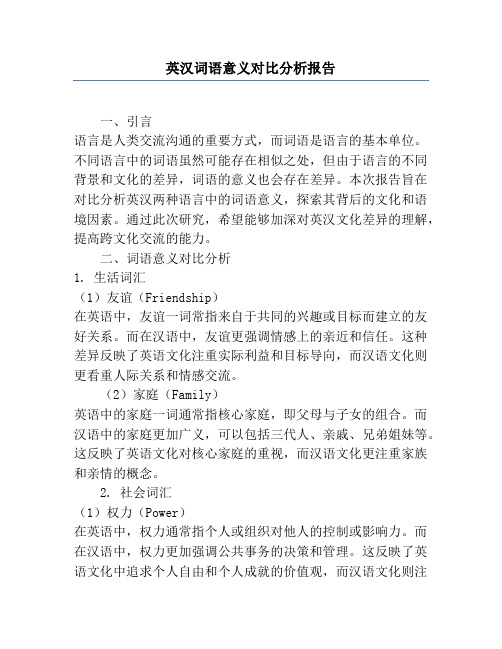
英汉词语意义对比分析报告一、引言语言是人类交流沟通的重要方式,而词语是语言的基本单位。
不同语言中的词语虽然可能存在相似之处,但由于语言的不同背景和文化的差异,词语的意义也会存在差异。
本次报告旨在对比分析英汉两种语言中的词语意义,探索其背后的文化和语境因素。
通过此次研究,希望能够加深对英汉文化差异的理解,提高跨文化交流的能力。
二、词语意义对比分析1. 生活词汇(1)友谊(Friendship)在英语中,友谊一词常指来自于共同的兴趣或目标而建立的友好关系。
而在汉语中,友谊更强调情感上的亲近和信任。
这种差异反映了英语文化注重实际利益和目标导向,而汉语文化则更看重人际关系和情感交流。
(2)家庭(Family)英语中的家庭一词通常指核心家庭,即父母与子女的组合。
而汉语中的家庭更加广义,可以包括三代人、亲戚、兄弟姐妹等。
这反映了英语文化对核心家庭的重视,而汉语文化更注重家族和亲情的概念。
2. 社会词汇(1)权力(Power)在英语中,权力通常指个人或组织对他人的控制或影响力。
而在汉语中,权力更加强调公共事务的决策和管理。
这反映了英语文化中追求个人自由和个人成就的价值观,而汉语文化则注重整体利益和社会秩序。
(2)公义(Justice)英语中的公义通常指法律和道德的公正与合理。
而在汉语中,公义更加强调道德和伦理的原则。
这反映了英语文化中法律体系和法治的重要性,而汉语文化更注重道德与人情之间的平衡。
3. 文化词汇(1)自由(Freedom)英语中的自由强调个人行动和选择的自主性。
而在汉语中,自由更强调在合理的范围内不受束缚。
这反映了英语文化中追求个人独立和自主的价值观,而汉语文化更注重个人在集体中的责任和义务。
(2)文化(Culture)在英语中,文化一词通常指一定地域和社会群体内所共同持有的价值观、信仰和行为模式。
而在汉语中,文化更强调传统、历史和人文底蕴。
这体现了英语文化中对多元文化的包容和尊重,而汉语文化则更注重传统和历史的传承。
汉译英_词语的翻译
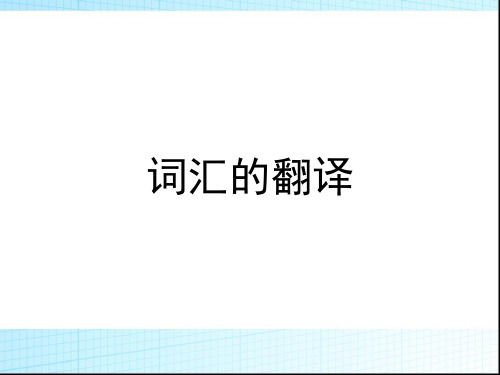
• 裸官 • An official alone at home with his or her family members emigrated abroad • 月光族 • Referring to a group of young people who make both ends meet each month • 啃老族 • Who live off their parents • 耄耋之年 • Referring to the age from eighty to ninety
• 有迹象表明,玛丽转变了观念,她打算举行一个 盛大的生日聚会。
2. 汉语中动词和量词用得多
• 他拿起杂志,看了一眼,摇了摇头,把它放回桌 子上。 • 一寸相思一寸灰,一江离恨一江愁, • 一串笑声、 一孔之见
3.英语的替代、省略vs. 汉语的重复
• The child doesn't like this book. Show him a more interesting one. • Look at that bird. It always comes to my window. • She plays the piano better than she does the guitar. • He said he would tell me the news, but he didn't do so. • She wore the red dress, but the blue suits her better. • It might rain, but I don't think it will. • 人不犯我,我不犯人;人若犯我,我必犯人。
• 这些钱你是白送。
• You just throw away your money. • 下雨了,我给你送雨伞来了。 • It is raining now. I have brought you an umbrella. • 谁去送广告?
英汉词语搭配的对比
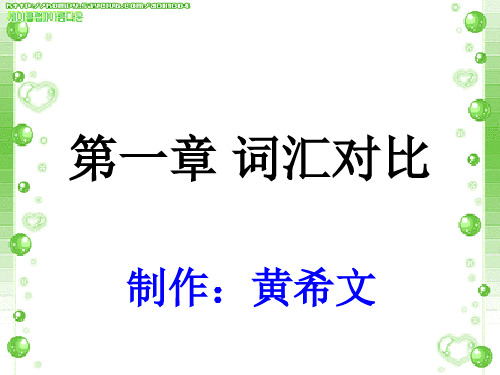
same old same old 还是老样子 show you're right 表示赞同 street sweeper 机枪 sure =surely
1、台灯
汉语侧重放置地点
reading lamps 英语侧重用途
2、密码锁
汉语侧重保密功能
combination lock 英语侧重数字组合
(kill既可以指人与动物,也可 以用于植物)
(1)词语有强弱之分
(hand in hand手拉手)
(2)语义偶和
英汉第三个相似之处
风雨交加 combine wind with rain raining cats and dogs 各有所爱 everyone has what he or she loves one man's meat is another man's poison
第一章 词汇对比
制作:黄希文
1.4 英汉词语搭配的对比
制作: 黄希文
Game : word formation
Step one:Chinese composition
心
01
02
03
04
05
06
倾心 give heart give one's heart to
放心 set heart at ease set one's heart at ease
Choose the best answer. 1、a cat with nine lives. A、猫有九命。 B、富有生命力的人。 C、命运无数。
Choose the best answer. 2、First things first. A、第一件事是最重要的。 B、第一件事是首先的。 C、凡事都有轻重缓急。
汉英词汇对比

3.词义不对应 heel of Achilles lady bird book bank French chalk French Fry old girl dog days a castle in Spain
要害 瓢虫 旧书店 滑石粉 炸薯条 女校友 三伏天 空中楼阁
(二)词义并行 指英汉语中认同某一事物或概念,但表达方式不一 样。 犹如雨后春笋——just like mushrooms(蘑菇) 他瘦得像猴子——he is as thin as a shadow. 水底捞月——fishing in the air(空中钓鱼) 乱七八糟——at sixes and sevens(六六七七) 一个和尚挑水吃,两个和尚抬水吃,三个和尚没水 吃。——one boy is a boy,two boys half boy,three boys no boy.
9.Ogle:向· · · 抛媚眼,做媚眼,色迷迷地看 10.Peer:凝视,盯着看,细看,观察、谛视或费力 地看 11.Peep:窥视,偷看, 12.Stare:盯,凝视,注视,目不转睛把· · · 看得 13.Squint:迷眼看,侧眼而看,成斜视眼,乜斜 14.Wink:眨眼,眨眼示意,使眼色,
汉英词汇对比
一、汉英词汇总体对比 二、汉英语词语理据、词化程度对比 三、汉英词汇内部各种关系的对比 四、汉英词汇意义对比 五、汉英借词对比 六、汉英对应语义类别(如颜色词、拟声词、动物词等)比 较 七、汉英习语对比
一、汉英词汇总体对比
张启昌、张而立《一份英汉词汇对比调查报告》(1994) 进行词汇对比:
瞋视 glare, stare angrily 凭眺 look delightedly from above into the distance 俯瞰 look down delightedly at 瞻仰 look up reverently at 窥视 peep, peek, pry, spy on 瞪眼 glare, glower, goggle, stare with sullen annoyance or anger or threatening, 呆视 gawk 瞥视 shoot a quick look at
5.英汉语言的比较分析-词语汇总
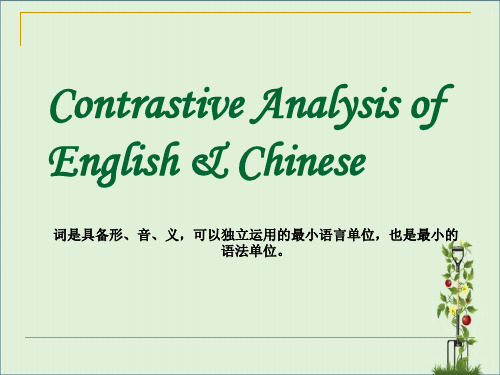
山——hill, mountain 你,您——you
鸡——hen, chick, cock, rooster
江,河——river
青——blue, green
父,母——parent
借——lend, borrow 兄,弟——brother
兔——hare, rabbit
枪,炮——gun
鼠——mouse, rat
2)贾母笑道:“你不认得他,它是我们这里知名的一 个泼皮破落户儿,南省俗谓作‘辣子’,你只叫他 ‘凤辣子’就是了.”
“You don’t know her,” said Grandmother Jia
merrily. “She’s a holy terror this one. what we
下面几例是“道”在<<红楼梦>>第三回的4种译法. “道”在早期文言中,是“说”的意思。宝玉初见黛
玉,送她“颦颦”为别名,探春问宝玉取此名的缘 由,宝玉引经据典说得头头是道,然后便有了以下 的对话:
1) 探春笑道:“只恐又是你的杜撰.” 宝玉笑道:“除<<四 书>>外, 杜撰的太多,偏只我是杜撰不成?”
language family, Language types, Writing system,
Phonetics, Vocabulary, Word order, Function words, Sentence structure, Style, etc. 3. Comparison and Contrast of C-E languages
litchi, jiaozi, panda, moon cake, Peking Opera, brick tea.
英汉词语对比与翻译

(3)幽默(humor)、引擎(engine)
(4)保健(health protection)支部
(branch) 5.术语: 整数、分数、元素 6.特殊用语(1)敬语:“令”、“贵”、 (2)谦辞:敝、愚、小、拙 7.简称(1)抽取法:支部书记- 书记;科学 技术——科技
(2)标数法
英语表示人的后缀按附加的语义可分为这几类:
1,表示人的某种职业 -an historian -ant merchant -ar scholar -eer engineer -ist pianist -or author 2,表示具有某种职务 -ain captain -al principal -arch monarch -ary secretary 3,表示来自某个地方的人 -er villager -ese Chinese
汉语的字和词有区别:
单音节语素:实语素和虚语素 多音节语素
汉语词汇包括基本词汇和一般词汇
基本词汇:词汇的核心部分,发展过程中变
化最稳定、应用最广泛、构成新词能力最强 的那些词:天、地、山、水、年、门等。 一般词汇:1.古语词:天子、诸侯、尚书 2.新语词:克隆、计算机、网络 3.方言:二流子、母猪 4.外来词(1)咖啡coffee、尼龙nylon (2)卡宾枪(carbine)香槟酒 (Champagne)
4,表示信奉或信仰某种主义者 -an repulican -crat bureaucrat 5,表示做某种动作对人 -al rival
-ant/ent agent -ard laggard 6,表示感情色彩 -aster 带有“小、臭、丑”等轻蔑意味 Poetaster (大油诗人) criticaster 低劣的批评家 7,表阴性
第二讲 英汉词语比较与翻译一

转化法 (conversion)
形容词转成动词的现象也常出现在现代汉语里。 如:
d.这可苦了我了。 I had a really hard time.
e.这位歌星一推出就红了起来。 The singer rose to stardom soon after her introduction.
size n.大小,尺寸
to size somebody up v.打量
转化法 (conversion)
以下是常见的名一动转化:
身体 名词
动词
back 背
支持(to back up a conclusion}
stomach 胃 stomach)
消化,容忍(a book hard to
工具 名词
动词
ladder 梯子 with
架梯或梯状物(a wall laddered
shelves)
hoe
锄头
锄地(to hoe in the filed)
chain 锁链
拴住(to chain the door)
ship
船
航运(old electronics shipped to
【翻译策略】翻译这类英语词汇时要注意:
1)对于一个英语前缀,汉语中可能有多个对应词素, 比如,anti一与某些社会行为、社会意识组合时常 译成“反”,如anti-terrorism(反恐),antiapartheid(反种族隔离);与某些物质或自然现象组 合时常译成“抗”,如antigens(抗原),anticancer(抗癌的),anti-virus(抗病毒的,杀毒液)。 当然,anti一还可以其他译法,如antiseptic(防腐 剂)。
《英汉词汇对比》课件

英语和汉语中的主动语态表达方式也有所不同,例如英语中 的主动语态通过动词原形表示,而汉语中的主动语态则通过 添加“把”等词语来表示。
04
英汉词汇的习语对比
动物习语对比
动物习语对比
在英语和汉语中,有些动物词汇具有特定的文化含义和象征意义。例如,“龙” 在汉语中是吉祥、权力和成功的象征,而在英语中则没有类似的象征意义。
英汉词汇的创新发展
新词的创造
随着社会的发展和科技的进步,新的概念和事物不断涌现,英汉词汇也在不断创新。例 如,“selfie”(自拍)就是一个近年来新出现的英语词汇,而汉语中也有类似的新词
,如“网红”、“拼车”等。
网络语言的流行
网络语言是近年来英汉词汇创新发展的一个重要方面。网络语言的特点是简洁、生动、 幽默,如英语中的“LOL”(Laugh Out Loud)和汉语中的“给力”等。
音译与形译
音译
根据外语词汇的发音,寻找发音相近 的汉语词汇。适用于人名、地名和技 术术语等。
形译
根据外语词汇的拼写形式,寻找拼写 相似的汉语词汇。适用于形象特征明 显的词汇。
加注与解释
加注
在译文中添加注释,解释外语词汇的文 化背景、用法和含义等。适用于文化差 异较大的词汇。
VS
解释
在译文中对词汇进行解释,说明其含义和 用法。适用于含义较为抽象或复杂的词汇 。
等构词元素来创造新词。
汉语词汇的特点
汉语词汇比较注重意义和内涵,表 达方式相对固定,新词的创造通常 是通过语义引申或借词来实现的。
英汉词汇的分类
英语词汇可以分为名词、动词、形 容词、副词等类,而汉语词汇也可 以根据语义和语法进行分类。
英汉词汇的文化内涵
英语词汇的文化内涵
汉英词类划分对比

汉英词类划分对比英语和汉语存在差异。
从谱系方面来说,汉语属于汉藏语系,英语属于印欧语系。
从文字系统方面说,汉语属于表意文字,英语属于拼音文字。
从语音方面说,汉语是声调语言,英语是语调语言。
从汉语和英语词汇对比的角度来说,词汇的对比包括词语语义对比,词汇的语法对比,汉语和英语划分词类的理据比较。
这里主要从词汇语法及词类划分理据方面来对英汉词类划分进行对比。
词类的辨别有形态、意义和功能三个标准,根据功能来确定词类是最科学的。
汉语和英语中都有词类活用,汉语比较突出。
汉语主要根据功能来定词类,英语由于在不断的发展过程中,形态不断简化,根据形态变化来确定词类困难很大,因此也必须要根据功能来定词类。
同时英语要考虑形态和意义,汉语要考虑意义。
一、汉英词类的划分(一)汉语词类的划分词类是词的语法性质的分类。
划分词类的目的在于说明语句的结构和各词类的用法。
分类的依据是词的语法功能?p 形态和意义,主要是词的语法功能。
按汉语语法的老传统,词可以先粗略分出实词和虚词。
过去曾以意义为标准,意义实在的叫实词,意义空灵的叫虚词。
“实词和实词组合能产生句法关系。
实词在句法中表现出不同的组合能力。
根据组合能力的不同可以把实词分为体词、谓词、加词三类。
体词包括名词、数词、量词;谓词包括动词和形容词;加词包括区别词和副词。
另外还有代替以上各类实词的代词。
虚词在句法中起附着或连接作用。
”(张斌,2008:217)“现在把功能作为主要依据,认为:能够单独充当句法成分,有词汇意义?p 语法意义的是实词,不能够充当句法成分只有语法意义的就是虚词。
实词再细分为名词?p动词?p形容词?p区别词?p数词?p量词?p副词?p代词以及特殊实词拟声词?p叹词;虚词在细分为介词?p连词?p助词?p语气词。
”(黄伯荣,2002:11)(二)英语词类的划分戴炜栋说(2006:7):“英语的词就其语法功能来说,分为封闭词类和开放词类。
”封闭词类指所有的功能词。
英汉词语翻译技巧
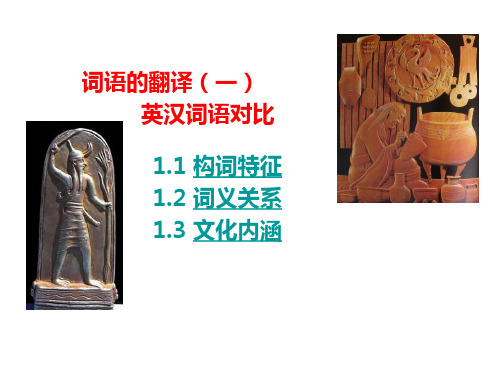
1.1 构词特征 (Features of Word Formation)
汉语:字,词组,由“字”所构成的灵活多样、数量巨大的词 是汉语使用的主体层级,其使用价值为最高。
早期汉语词语以单音节和多音节的单纯词居多:“天”,地”, “人”,“蜘蛛”,“彷徨”,“窈窕”,“徘徊”,等等。发 展过程中,汉语词汇构词方式日益多样化,合成词逐渐增多;汉 语还吸收了许多外来词汇。
fox ... 狐狸 狐狸(一种哺 乳动物) ... ... 比喻意义:狡猾的人(如:as sly as a fox;“他真是一只老狐狸。” ...
Semantic Correspondence and Translation 词义相符时的翻译
词义相符时一般可采用的翻译方法有: 一)直译法 例如: 1)anger 愤怒 2)cyberspace 电脑空间 3)肺炎 pneumonia 4)主板 main board 5)bad egg 坏蛋 1)pour oil on fire 火上浇油 2)丢脸 lose face 8)混水摸鱼 fish in troubled water
1)这本书反映了30年代的中国社会。(动词) The book is a reflection of Chinese society in the 1930s.(名词) 2)我们打算乘火车去北京。(动词) We’ve planned to go to Beijing by train. (介词) 3)我确信你会成功。(动词) I am sure that you will succeed.(形容词)
英语:词,短语,当今世界上国际性最强,使用最广泛的语言, 词汇量颇为丰富。 发展过程中,1)新造词(coined-up words; coinage); 2)通过各类构词法产生新词 (words from new formations); 3)吸收了大量外来词汇 ( loaned words; loans)
英汉语比较与翻译6 代词

• 在照应这一手段中,英汉语篇最显著的差别是:英 语有关系代词,而且使用频率很高;而汉语没有关 系代词,因此在很多情况下,汉语中的人称代词在 译文中常常可以用英语中的关系代词表示。如:
• 这张条子是安娜留的,她刚才到这儿来过。 • This note was left by Anna, who was here a moment ago.
• There is no doubt about it; you are the student who impressed me deeply. (cataphora) 下指/后指
• According to their meanings, adverbial clauses can be divided into nine kinds. (cataphora) 下指/后指
• 2. 询问敲门人“你是谁”时,由于不明对方身份, 用it。 • --Bang bang bang! (Knocking at the door) • --Who is it? (“it”指“你”) • 3. 劝吃东西时用自身代词。例如: • 请你随便吃些蛋糕吧。 • Help yourself to the cakes.
• 代词可以代替短语、句子,甚至一大段话语表达的意思。 它 能指代人物、时间、地点、数量、程度和事件。 • Your spoken English is excellent; I will not forget it. (anaphora) 前指 • I gave my wife a fur coat for her birthday, which pleased her a lot. (anaphora) 前指
• 3. 在成人和孩童、医生和患者之间的对话中,成人、 医生常用we来称呼孩童、病人,表示“你”。 • (幼儿园阿姨对小朋友)How are we this morning? 今天早晨你好吗? • (医生对病人) Can ’ t we open our mouth a little wider? 你嘴巴再张大一点好吗? • (琴师对学生) Shall we play the tune once more? 你再弹一下这个调好吗?
英汉词语对比与翻译【打印版】
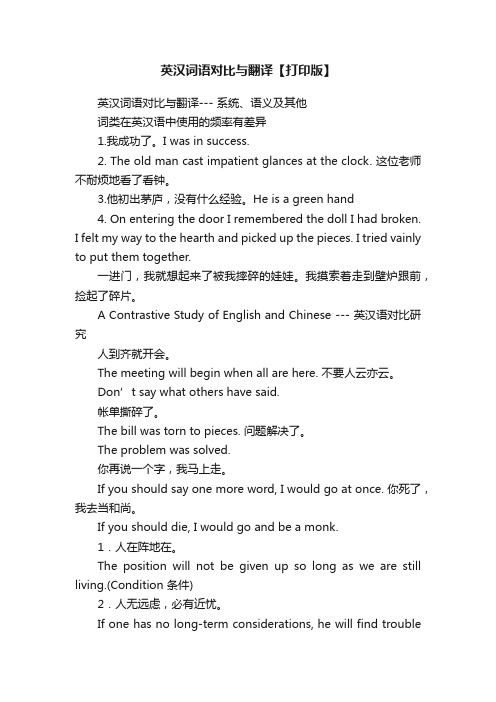
英汉词语对比与翻译【打印版】英汉词语对比与翻译--- 系统、语义及其他词类在英汉语中使用的频率有差异1.我成功了。
I was in success.2. The old man cast impatient glances at the clock. 这位老师不耐烦地看了看钟。
3.他初出茅庐,没有什么经验。
He is a green hand4. On entering the door I remembered the doll I had broken.I felt my way to the hearth and picked up the pieces. I tried vainly to put them together.一进门,我就想起来了被我摔碎的娃娃。
我摸索着走到壁炉跟前,捡起了碎片。
A Contrastive Study of English and Chinese --- 英汉语对比研究人到齐就开会。
The meeting will begin when all are here. 不要人云亦云。
Don’t say what others have said.帐单撕碎了。
The bill was torn to pieces. 问题解决了。
The problem was solved.你再说一个字,我马上走。
If you should say one more word, I would go at once. 你死了,我去当和尚。
If you should die, I would go and be a monk.1.人在阵地在。
The position will not be given up so long as we are still living.(Condition 条件)2.人无远虑,必有近忧。
If one has no long-term considerations, he will find troubleat his doorstep.(Condition 条件)3.病来如山倒,病去如抽丝。
- 1、下载文档前请自行甄别文档内容的完整性,平台不提供额外的编辑、内容补充、找答案等附加服务。
- 2、"仅部分预览"的文档,不可在线预览部分如存在完整性等问题,可反馈申请退款(可完整预览的文档不适用该条件!)。
- 3、如文档侵犯您的权益,请联系客服反馈,我们会尽快为您处理(人工客服工作时间:9:00-18:30)。
第一讲汉英语言对比与翻译
你不理财,财不理你
If you leave “Managing Money” alone,
Money will manage to leave you alone
中药材广告:“药材好,药才好。
”
Only fine medicinal herbs
Make fine herbal medicines
“美的” 家电,美的全面、美的彻底
Midea products are beautiful---beautiful from head to toe, beautiful inside out.
中国人自古就具有强烈的创新意识。
“周虽旧邦,其命维新。
”“天行健,君子以自强不息。
”事实证明,没有改革开放,就没有中国的今天;没有改革开放,也不会有中国的未来。
The Chinese people have long had a strong inclination towards innovation. As ancient Chinese sayings go, "Even an established nation like Zhou still regards self-renewal as its mission;" and "As heaven maintains vigor through movements, a gentleman should constantly strive for self-perfection." What has happened shows that without reform and opening-up, China could not have come to where it is today, nor can it have a future.
中阿建交40多年来,在双方共同努力下,两国关系持续快速发展。
阿根廷史诗《马丁·菲耶罗》中有这样一句话:“兄弟之道是团结同心。
”中阿已经成为相互信任的好朋友、平等互利的好伙伴。
Since the establishment of diplomatic relations more than 40 years ago, our bilateral ties have moved forward rapidly thanks to the joint efforts of the two sides. As a line from the Argentine epic Martin Fierro goes, "Brothers have to be united, because this is the first law." China and Argentina have become trustworthy friends and equal partners in win-win cooperation.
我进去看了,只记得门警是瑞士兵士,穿着黄色制服,别的没有印象了。
I went there to have a look. All I remember now is that the guards at the entrance were Swiss soldiers in yellow uniforms.
汉语为加强语气,对于一件事,往往从一个方面说了之后,还要从另一个方面说一说。
英语则不然,前面有了All I remember now is ...,后面如果再说and I don't remember anything else,就显多余
中国有13亿多人口,陆地自然资源人均占有量低于世界平均水平。
China has a population of more than 1.3 billion, and its land natural resources per capita are lower than the world’s average.
此处“水平”未译。
“方面”、“方式”、“问题”、“情况”之类的范畴词,在汉语句子里没有多少实际意义,但很有用,可以使句子流畅。
汉译英时,范畴词可以不译,英译汉时,可以酌情使用。
